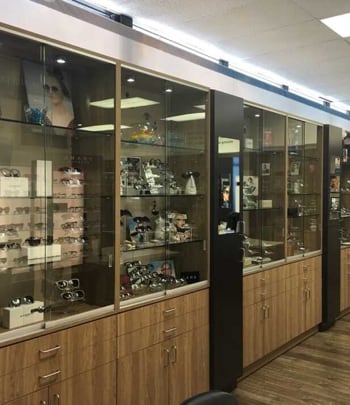A Lens-Free Path to Clarity
Prescription lenses are an excellent way to find clear, comfortable vision no matter your lifestyle. However, we understand if you’re looking for ways to possibly reduce your reliance on contacts and glasses.
Laser eye surgery is one way many people around the country find clearer vision without using prescription lenses, and these procedures are more accessible now than ever before. Our team can consult you on laser eye surgery and how it may serve you when you book a consultation appointment at either of our incredible locations.
The path towards permanent clarity starts when you book your appointment today!
What Is Laser Eye Surgery?
Laser eye surgery, or refractive surgery, is a group of different procedures ophthalmologists perform to correct a range of refractive errors. These errors can include:
The type of surgery you have depends entirely on your eye health and the issue you wish to correct. Some surgeries reshape parts of your cornea, while others outright replace your crystalline lens with an artificial intraocular lens. The only way to determine which procedure is right for you is by visiting us for a consultation.


Our Consultation Process
Consultations are eye exams orientated to determine your candidacy for laser eye surgery. To start, you must be at least 18 years old and have a refractive error laser eye surgery can correct.
However, several other factors may affect candidacy, and we only recommend the procedure if your eyes are suitable for it. Some of these factors that could affect your candidacy include:
- Dry eye
- Frequent eye infections
- Corneal conditions
- Health conditions
- Large pupils
Co-Managing Your Surgery
Co-managing your surgery helps us ensure that your eyes heal correctly after the procedure through the course of several follow-up appointments. While most people report having clearer vision following laser eye surgery, it does not guarantee perfect 20/20 vision.
Some side effects can occur after surgery, including:
- Dry eye
- Light sensitivity
- Blurry vision
- Discomfort
- Halos or glare
Most of these side effects are common to experience after having laser eye surgery, and they should start to subside within a couple of weeks. If your symptoms don’t seem to be getting any better, please contact our team.
Common Types of Laser Eye Surgery
The type of surgery we recommend will depend on your vision and eye health. Following your surgery, we’ll work closely with your ophthalmologist to ensure your eyes heal properly and provide the results you’re expecting.
If laser eye surgery isn’t suitable for you, we’ll be happy to offer various alternatives to help you achieve clear, comfortable sight. From contacts to world-class frames and lenses, we’re ready to help support your sight.
LASIK
Laser-assisted in situ keratomileusis (LASIK) is a type of procedure that reshapes a part of your cornea to correct your vision. LASIK is the most common laser eye procedure, and it can correct issues like nearsightedness, farsightedness, and astigmatism.
Your ophthalmologist places numbing drops in your eyes before making a small incision in the outermost layer of your cornea, the epithelium, to create a flap. Folding the flap over gives your ophthalmologist access to your underlying corneal tissue, called the corneal stroma, which they’ll reshape using an excimer laser.
At the end of the surgery, your ophthalmologist will place the flap back in its original position to heal.
PRK
Photorefractive keratectomy (PRK) is a similar procedure to LASIK, but with a few different steps. We may recommend PRK if you have thinner-than-average corneas or dry eyes.
After placing numbing drops in your eyes, your ophthalmologist will make a small incision in the outermost layer of your cornea. Instead of making a flap, like in LASIK, they’ll remove this layer entirely before reshaping the underlying tissue with an excimer laser. The outermost layer will grow back on its own within a few days of the surgery.
RLE
Refractive lens exchange (RLE) is a unique process we may recommend for people with presbyopia.
After your ophthalmologist places numbing drops in your eyes, they’ll make a tiny incision that helps them extract your crystalline lens, the part of your eye responsible for focusing light on your retina. Your ophthalmologist replaces your crystalline lens with an artificial intraocular lens (IOL).
Find Out if Laser Eye Surgery Is Right for You
Find out if laser eye surgery is the right choice for you and your vision. Book a consultation appointment at Dr. Goldstone Vision Center today.
Visit Us Today

Visit us
Only 10 minutes down the road from Huntington Beach, you can find our practice in Magnolia Plaza, near Savers.
- 9107 Garfield Ave
- Fountain Valley, CA 92708
Hours of Operation
- Monday: 9:00 AM – 6:00 PM
- Tuesday: 9:00 AM – 6:00 PM
- Wednesday: 9:00 AM – 6:00 PM
- Thursday: 9:00 AM – 6:00 PM
- Friday: 9:00 AM – 6:00 PM
- Saturday: Closed
- Sunday: Closed


Our Brands




Our Google Reviews
Be the First to Know,
Be the First to Win.
From eye health insights to exclusive giveaways, your feed just got a lot clearer.








